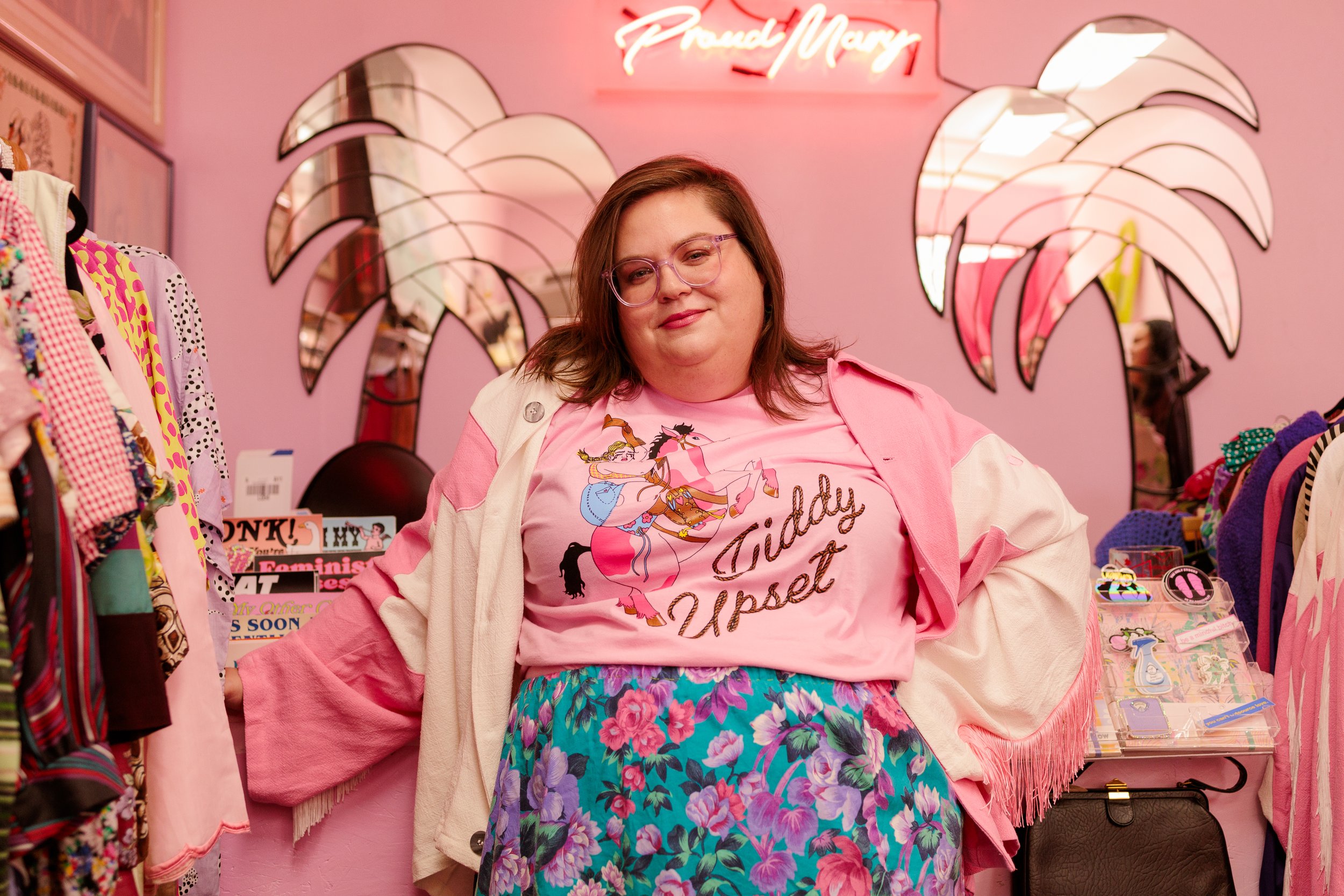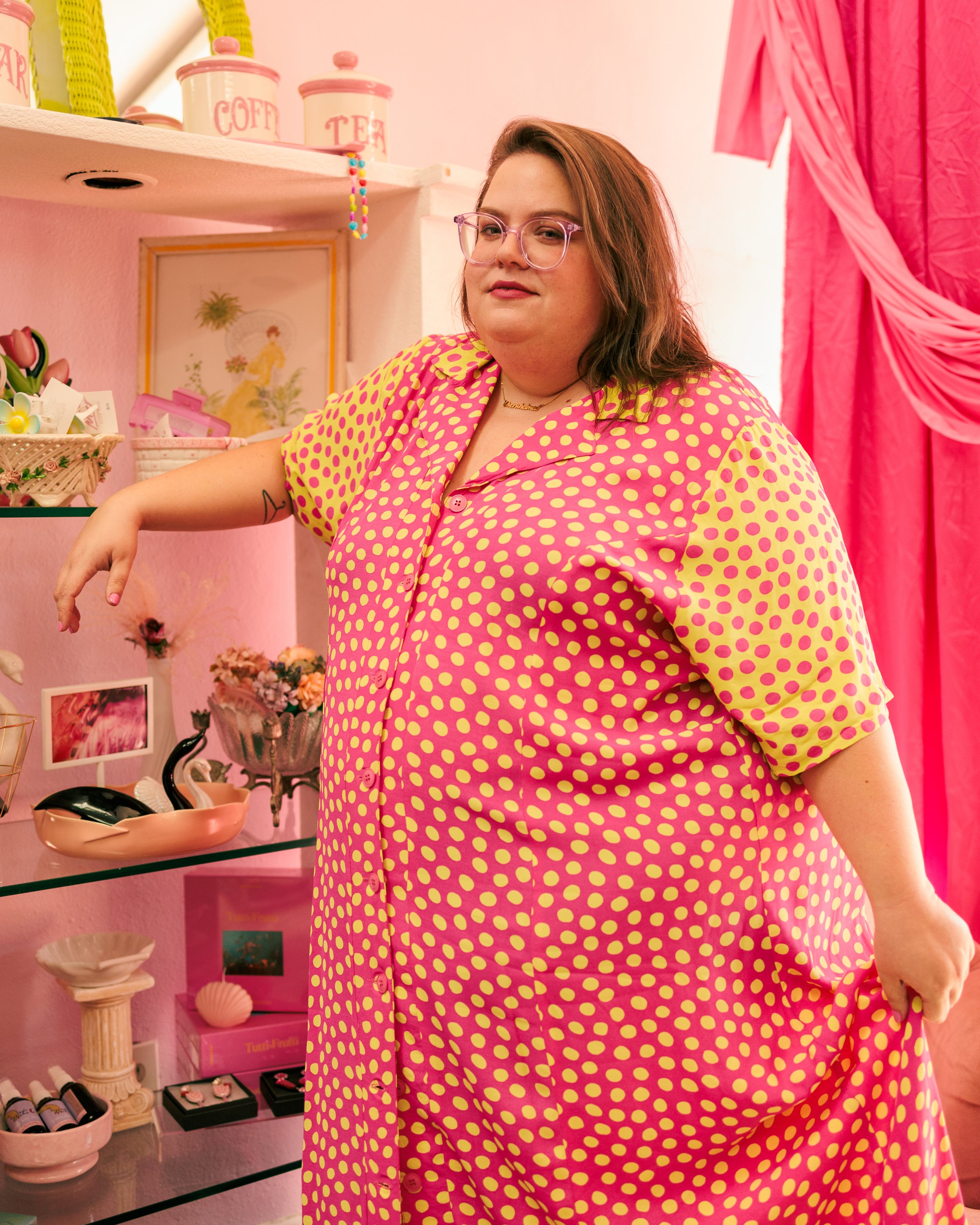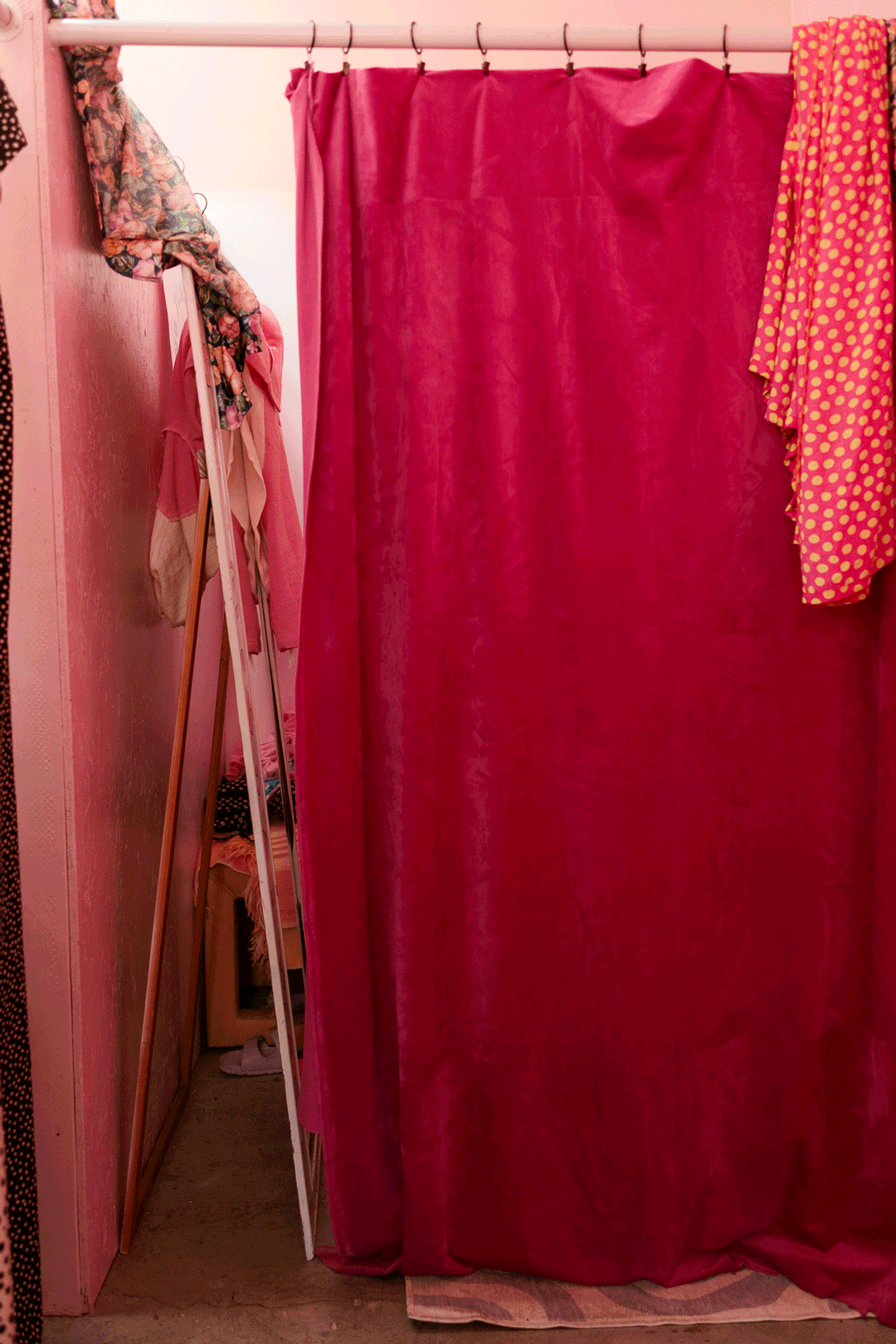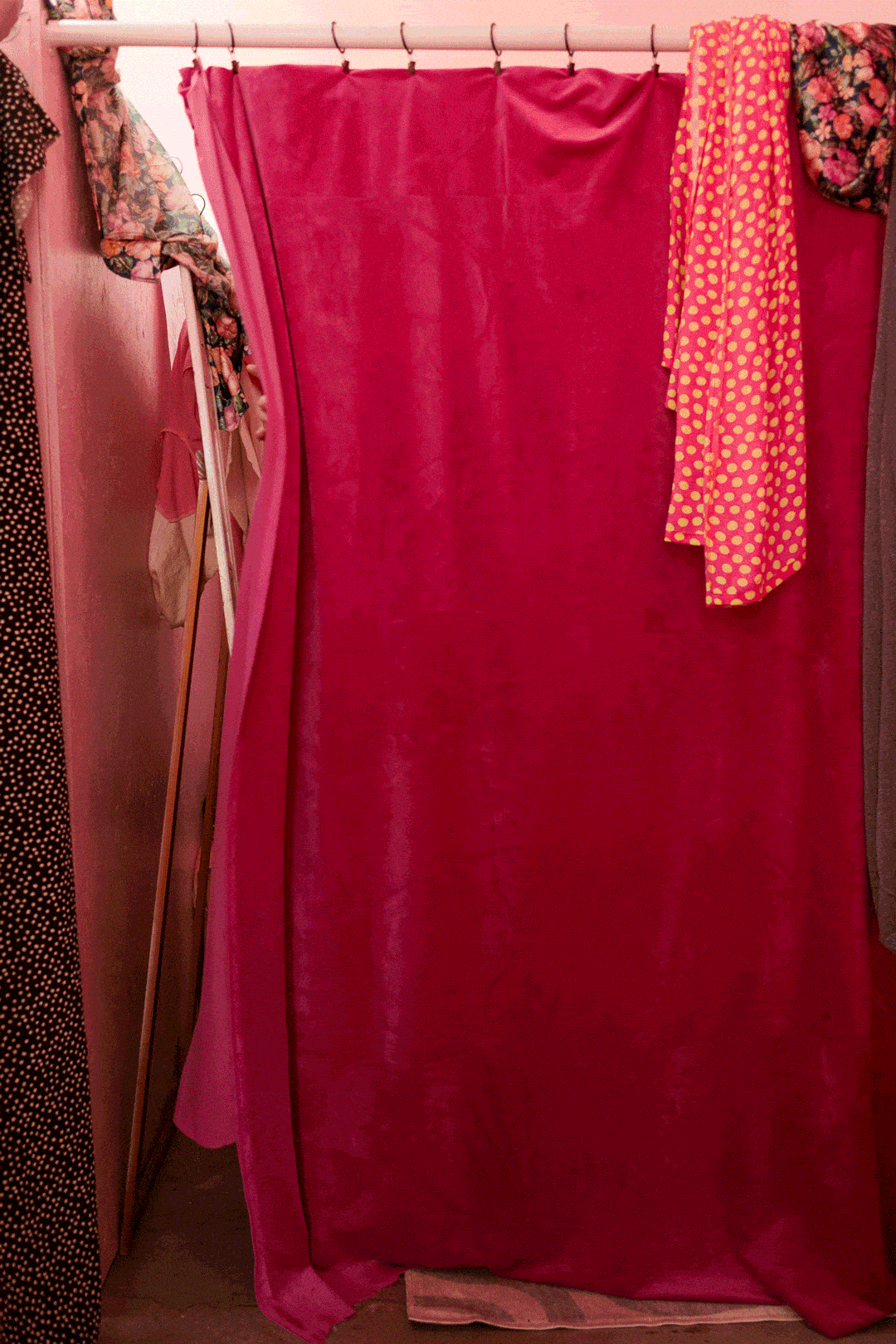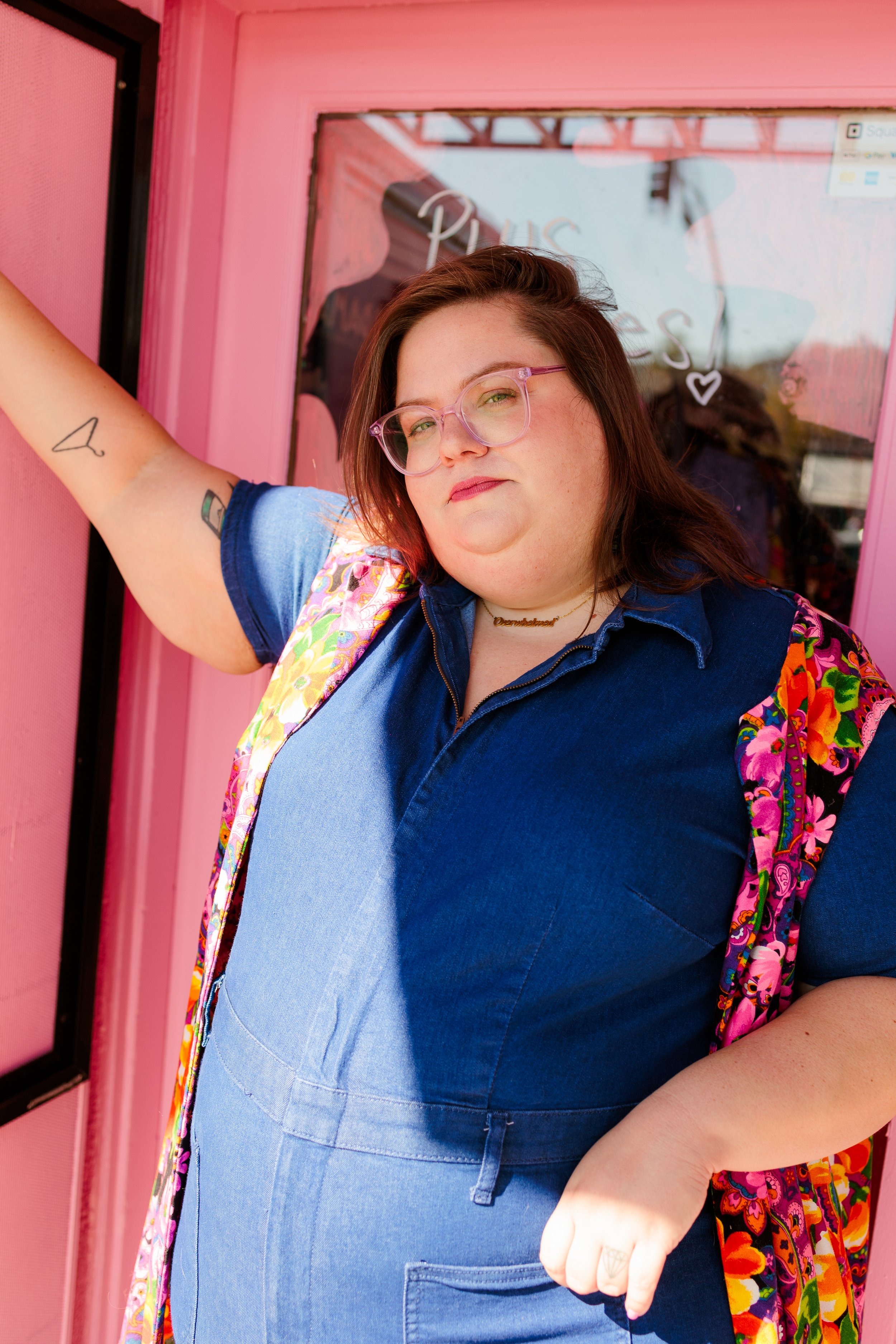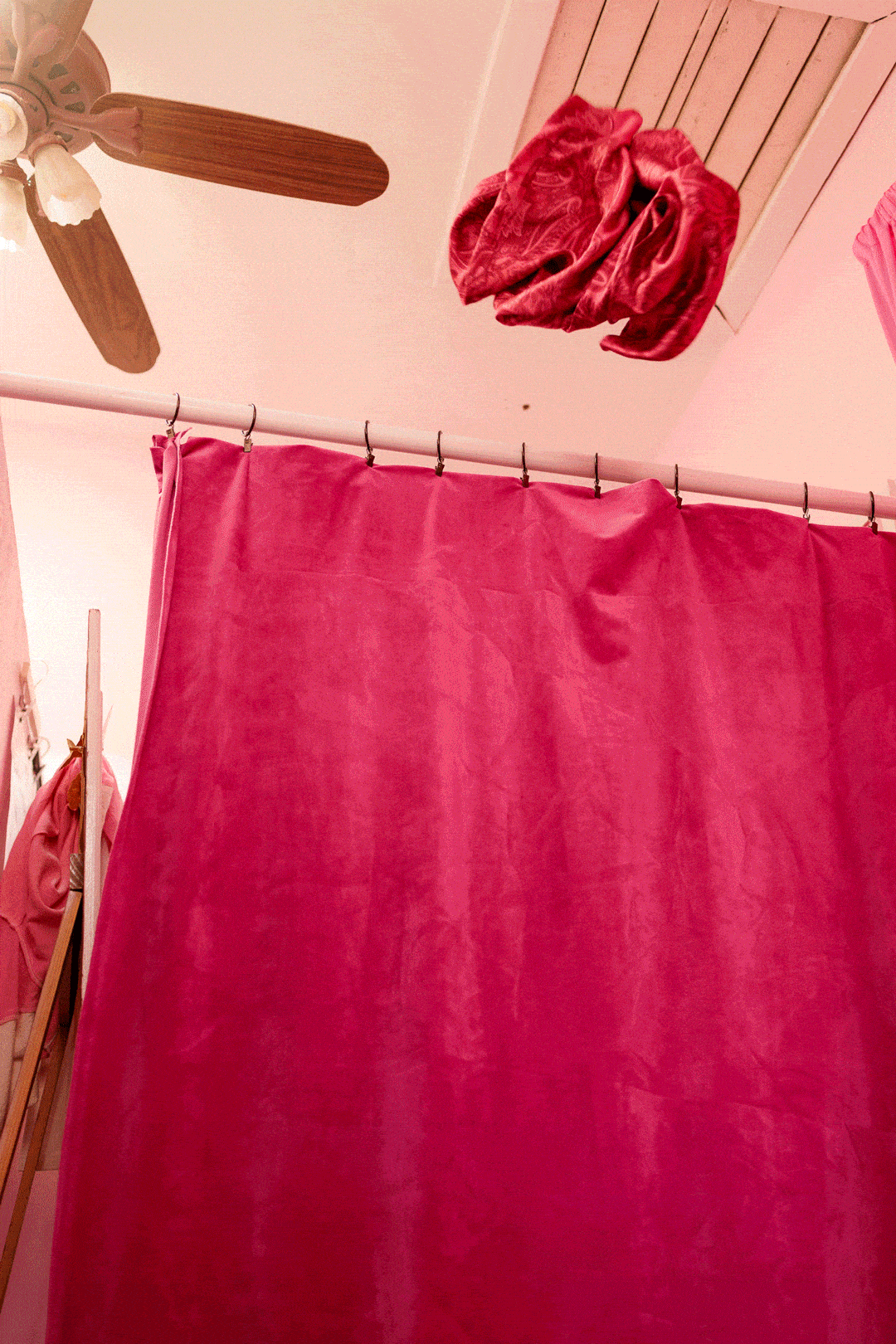Jessica Hinkle: Honoring Mary Lare
⤏ PROUD MARY’S JESSICA HINKLE ON BODY NEUTRALITY, FAT FRIENDSHIPS, AND HONORING THE MEMORY OF HER STORE’S NAMESAKE
⤏ SHIRT ON COVER DESIGNED BY REESABOBEESA FOR PROUD MARY
⤏ IN CONVERSATION WITH GISSELLE PERNETT
⤏ PHOTOGRAPHY BY JON DEL REAL
⤏ MAKEUP BY KATIE MANN
If you’re unfamiliar with the fat shopping experience it involves (unfortunately) going to your local mall, looking for the “plus size” or “curvy” section in the neglected part of the store, and going through racks of cold shoulder tops, unfunny graphic tees, and business casual blouses. The shopping experience would not be complete without a crying session in the dressing room because, surprise! The fashion industry is still very fatphobic!
Jessica Hinkle’s store —Proud Mary— creates a new experience. It’s fun, thoughtful and sets the standard of what everyone’s shopping experience should look like regardless of your weight. Named after her grandmother —Mary Lare— Proud Mary offers a curated selection of vintage finds, a strict no diet talk rule and cute in-house designs that would make anyone think, “why aren’t there more stores like this?” In between laughing at our shared experiences as fat women, we discussed internalized fatphobia, the ridiculous rules of fashion, and the importance of fat friendships and community.
GISSELLE PERNETT: I’m very excited to talk to you because you’ve been involved in body positive spaces and have spoken about fat liberation for years. Something I’m still working towards is being more open about being a plus sized person. But before we get into that last time we talked you were getting ready for Thick Thrift. How was it?
JESSICA HINKLE: Everybody there is generally so sweet. It's a nice place to go and it doesn't just feel like sell, sell, sell. You get to meet the vendors, new customers and people are genuinely excited to be in a place where they can shop and a lot of stuff is available to them. I think a lot of fat people don't even go to flea markets or different pop ups because they just assume unless it's specifically marketed to them there will be nothing for them. The organizers [of Thick Thrift] have created a place where there's so many options and it's just a good environment, and everyone's just happy to be there.
GP: I feel like people don’t realize how necessary spaces like Thrift Thick and Proud Mary are in fashion. I was literally like a kid in a candy store the first time I went to Proud Mary because I’ve never had that shopping experience where I can find 10 things I like and actually have them fit. We’re all familiar with the small plus size section and being dressed in business casual when you’re in the fourth grade.
JH: I've been in fat liberation spaces for about 15 years now and then doing Proud Mary in some respect or another for like 12 years. So it's funny that I'm still having these conversations because even though there has been movement within fashion and what's available and accessible, it's still bullshit. I don't even go to the mall anymore because it's depressing. It's dingy, the light bulbs are out and there's like four racks.
GP: And it’s always messy!
JH: Right! We deserve to have fun. Shopping shouldn't only be a necessity and obviously, I’m not talking about over consumption, but fat people deserve to have fun with style. This should be a place you want to go. Not “Oh my God, I need pants for work. I guess I have to go to the mall, and cry in a fitting room for 45 minutes.”
GP: And the difference between a thin person’s shopping experience and being plus sized is having to mentally be like, “Okay if nothing fits it’s not my fault.”
JH: It's exhausting and the majority of people in this country are plus size. So it's just so funny —not really funny— but just the fact that they're still not a proportionate amount of options for us. We have to do so much research and go to so many places just to find something. Those spaces all need to exist proportionately for us like they do for straight size people. And they still don't in 2023. After all of the pushing for fat liberation, all the influencers that have tried to work with brands and push them forward it's always one step forward, two steps back. We're still having the same conversations. It's obnoxious and tiring but there's also a lot of cool small businesses pushing that forward and some people in fashion, influencers and designers that are also trying to push that forward. It's just a very slow, slow progression.
GP: Growing up, what was your relationship with fashion when it came to looking for clothes in traditional retail stores? You’ve said fashion was something you were obsessed with as a child but something I think we know too well is fashion is not obsessed with us.
JH: And that’s the thing it’s like fashion —yes, they hate fat people— but it’s also a classist industry. I grew up poor so it felt very inaccessible as far as New York and runways. I would watch the runway shows on my staticky little TV. I would draw collections and fill up notebooks with clothes and [thought] one day I’ll be there. But I couldn't even find clothes that fit me from a young age because I grew up fat. My parents weren't very supportive. They were pretty fatphobic so my relationship with my body wasn't great. I teetered around a [size] 16 for most of middle school and high school. Once I got into high school I would dress in slacks and button downs because that’s what I could find at New York & Company or I would thrift clothes and maybe go to Hot Topic who had t-shirts I could fit into. So I’d wear band tees and flare jeans or I’d wear an outfit like I was going to an interview. There really wasn’t an in between because that's all that I could find.
My style I don't feel was reflecting what I would want to have worn. I just was very detached even though I loved looking at photos of clothes and drawing clothes. It was like a dissociative experience. That's not my world. I can appreciate it from the other side of the wall, but I didn't really get to experiment with style. That didn't really happen until my early twenties where I could start to have a say over what I was wearing because I wasn't with my parents and express myself differently because I wasn't in high school.
GP: I listened to your episode of the Lil Fatties Podcast and you talked about how your dad used to do all the sewing but was also very fatphobic. My mom was a seamstress and she learned all those “fashion rules” and I often think about how without meaning to do damage she passed on all those feelings to me.
JH: I think especially with those generations even if they were talking about themselves, they don't realize how we internalize it. I've had this conversation a lot recently with friends where I feel like our generation or millennials at least are the first generation where openly we talk about breaking those cycles. Obviously it's not a switch. It's not just going to turn off. It's going to take a long time. But we’re more aware and we have these discussions more about, how does my relationship with my body and how I talk about it in public affect me, my family and the people around me? And how can we be more thoughtful about reframing those things or not talking about them because we’re not just talking to ourselves when we do that —which is bad enough. We’re talking to everybody else that resembles us.
Both of my parents are also fat. I think to them we were an extension of them so it was how they felt about themselves and they just assumed that’s how we would would feel. But instead of thinking, “How can I build you up not to hate yourself?” They just thought, “I’ll shame you so you don’t look like me.” Never in the history of anything has that ever worked [laughs.] My parents are still in that mindset. They’re still very fatphobic. It’s just very sad. Life is so short I can’t image going through my life beating myself up for a body I inhabit.
“Do we fit in this arbitrary size or do we reach this arbitrary number on a scale? What is that going to do for me? That's not gonna make me a better person, that's not gonna make me happier.”
GP: I’m going to reference The Lil Fatties podcast again because truthfully I don’t have any fat friends so listening to people openly talk about the things I’ve gone through my whole life was such a healing experience. You mentioned you were neutral about the word “fat.” How did you get to that point?
JH: It was always on the tip of my mind. “How do I avoid it?” “I'm going to break down if somebody says that to me.” It just carried so much weight —no pun intended. So you cope with being funny or you feel like you have to add value to people's lives all the time, which is so messed up. It's something that was said a lot in negative connotations at home. Once I got to a point where I was out of my house, and around people that not necessarily celebrated being fat but were more neutral and were like who fucking cares? I started hanging out in music and art scenes and there was just so much more to discuss and do than your body.
Then I got into fat liberation spaces —which started on the internet back in Tumblr’s heyday— and reading people’s perspectives challenged what I had internalized from how I grew up and existing as a fat person in the world. All I needed was a different perspective. So you start thinking about all these aspects and why we owe beauty, what beauty means, how it's used to oppress people and make them spend money and all of these things. You get to a point where you're like, it doesn't matter what my body looks like. It's neither good nor bad. Nobody is better than another body. They're just bodies and we all deserve respect, love and care no matter what we look like. There's so much more to us, to life, to what's going on in the world that it seems like such a small thing to focus on. Do we fit in this arbitrary size or do we reach this arbitrary number on a scale? What is that going to do for me? That's not gonna make me a better person, that's not gonna make me happier.
GP: When did fashion become healing for you?
JH: That's a good question because at first it was more like a survival thing. The biggest part [of healing] for me is having a circle of friends that root for you. So when you come out and you’re wearing a weird outfit they’re like, “fuck yeah.” Instead of being around people that are like, “Should you wear that?” I am such a big believer in the importance of friendship and deep platonic intimate friendships and how they can support you and validate you. Not that you should seek outside validation, but it really does help you if you're around people that just want to see you happy. When I started to carve out those friendships and feel really supported and loved where I could just be myself, I started to look at fashion differently.
GP: Proud Mary is named after your grandma —which is so heartwarming— I just really want to hear more about her.
JH: I love that she's kind of been getting recognition lately. I love talking about her. Getting to talk to her is really cool because she passed away like 23 years ago now. I really loved her. She was very interesting. She was very different. She had five kids, and a lot of grandkids. She was very working class and kind of a hard ass, always yelling but showed love in her own way, and was always there. You could always go to her house. It was always a safe place for you to be, and it was always full of people. She dressed however she wanted to dress. She wasn’t fat, but also never commented on my body. I don't remember her ever putting me down for how I looked. And I remember her wearing very wild outfits. She would go to the thrift store all the time and pick up vintage stuff. She walked around the neighborhood yelling at the neighborhood kids. But she also knew how to let loose and she loved going to bingo. She was such an interesting person to watch and know. I adored her and really loved her. We were a big family and when I was naming the store, it didn't occur to me at first, but when it did, I was like, “Duh, of course, that's what it needs to be.”
GP: Oh my God, that's so cute. Her memory lives on.
JH: It always made me very sad that she lived in Southwest Philly her whole life and she didn't have a lot. Then she finally bought a house in the suburbs, she was retiring, and she was so excited and then a week before they were supposed to move in, she passed away. So she never got to get out of Philly. When I think about it, to be able to bring her to LA —I could cry thinking about it— makes me feel connected to her like she got to get out of Philly. She got to do something else.
GP: I’ll literally start crying with you. You’ve said that she was the one who taught you how to source vintage pieces. What were some of Mary’s tips and tricks?
JH: She just had a specific eye. She was drawn towards the weird things. One time she randomly bought me this beautiful vintage nightgown set. But I was like, “Where am I gonna wear this?” And she's like, “I don't know, be a ghost for Halloween.” I think she was more just drawn to weird prints and cuts. I wasn't at the time because I was a kid, I was fat and I had all this internalized fatphobia. But now I am attracted to those same things. It was more about finding what you like. You don't need to think about why or rules. Just wear it because who cares? There's so little joy in life that you might as well just grab it when you can find it.
GP: What was your favorite childhood outfit?
JH: I had this outfit that was little denim shorts with sunflowers on them, a yellow top and a blossom hat. If you don't know what that is, it's a hat with a big ass flower on it like the nineties show Blossom. I thought I was so cool in that outfit and I think I had little leather sandals to go with it. There’s another outfit that sticks out because I hated it so much. My parents used to make me wear it —and I don’t know where they got it— but it was a sweat suit and on the shirt it said, “Hip hop” and down the leg of the sweatpants it said “Hooray.” I don't know if that's a Naughty By Nature song but I didn't like it and they made me wear it all the time.
GP: I'm going to ask you because you design clothes. Is it really that hard to make cute plus size clothes?
JH: It's very diy for me. So yes and no, There's a struggle for me personally to design things because I don't have that education. There's certain things I don't know how to articulate when I'm working with a pattern maker or a seamstress. It’s easy because I know what I want. I can sketch it out and I can give examples and in that respect a lot of people are able to work with that. But if I wanted to create something that doesn’t exist, I wouldn’t know how to do that. I would probably have to hire a technical designer to work with —specifically making clothes for fat people. I don’t think it’s hard but I’m also a fat person. I know what the areas of improvement generally are, like I know that for a long time sleeves never fit. Or to make sure when you’re grading up a size, you’re giving enough space for the way bodies change as they get fatter.
I think people that mass produce clothes —it’s not hard for them. They just don’t care. It’s such a numbers game when you get into corporations or big stores like Forever 21. It’s not hard but you do have to have the time to make sure you’re testing the fit on all sizes. So for small businesses —where money is a resource that’s not often had— you do have the time because it’s a slower model. But for somebody like Forever 21 where they’re producing six months to a year in advance they don’t have time to fix a fit issue. Nor do they really care, nor are they hiring fat designers because how many fat designers are there? We don’t feel like we can go to design school. Then once we get out into the world it’s less likely that somebody’s going to hire a fat person over a thin person. There’s all these things why people think it’s hard to create clothes specifically for fat people when it’s just capitalism and fatphoia. That's the issue. There's not enough fat designers, and there's not enough fat people in management.
“You don't need to think about why or rules. Just wear it because who cares? There's so little joy in life that you might as well just grab it when you can find it.”
GP: What are your closet staples?
JH: Oh my gosh. I feel like I go between either wearing very neutral things or really colorful statement pieces. On the day to day I wear a lot of tapered pants. My everyday —if you’re familiar with Full House— is like Uncle Joey. I wear a lot of dresses just because I'm always running around. I feel like my style is kind of lazy unless I'm dressing up for a special occasion. I love wide leg pants with a crop top or a cool shirt. I tend to wear a lot of black or just a very print heavy dress. I just got this dress from a friend. When I'm done with it, I'll just pass it along like the sisterhood of the traveling dress.
GP: It’s so cute I’ve been staring at it this whole time. And how often can you share clothes with your friends?
JH: It's such a nice experience to be able to do that. Just being around people that look like you, understand the things you understand, you can share those experiences with seems like such a small thing but when you grow up not having that it’s extra special.
GP: Community is important! Fat friendships are important! Oh my god when you were talking about Taylor [Nicole Mitchell from The Lil Fatties Podcast] and her bouquet making class. That was the cutest thing I had ever heard.
JH: She is literally the cutest human in the world. Watching her start the podcast and get involved in the fat community more has been so lovely. It's just so cool to watch people put content out into the world specifically for fat people because not only do we need a perspective shift but we consistently need reminders because we’re always internalizing so much fatphobia. It's never just a switch so even if we as a collective, as a society say it's really bad to fat shame people, it's really bad to body shame people there’s still so much to undo. It’s going to take so long that we constantly need other perspectives to remind us that there’s nothing wrong with us.
GP: What's something that you hope people take away from Proud Mary?
JH: I just want people to feel welcomed. There’s so many spaces that people don't feel welcomed in the world as a fat person. You go from feeling invisible to hyper visible and you can never just feel peace and feel like something was made for you. This is a very small space —in a perfect world, I’d have a whole mall— but I just want people to walk in and be like this is for me. It’s not an afterthought because I’m worth more than that. I just want them to feel like they deserve to play around with style because they’re deserving of joy, and they’re deserving of people thinking about their comfort, and their happiness. I want them to walk away feeling excited, and seen, and safe because those are the things I started to feel that literally changed my life.
GP: Not to get sentimental —but I am a sentimental girl— what do you think grandma Mary would think of Proud Mary today?
JH: I think she would be really proud, no pun intended. She was the matriarch of our family. She held it together. When she passed away there was a noticeable shift in how we gathered. I think she would be proud that there was a space in her honor. Just knowing that she had a positive impact on her grandkids, I think she would feel really good about that. I know it's a store and I know we sell stuff, but that's not really why I started doing this. It’s more about creating space for me. I hope she would take all those things and feel really proud that she did a good job. I think that would make her happy and now more people know about her and that is so special.

